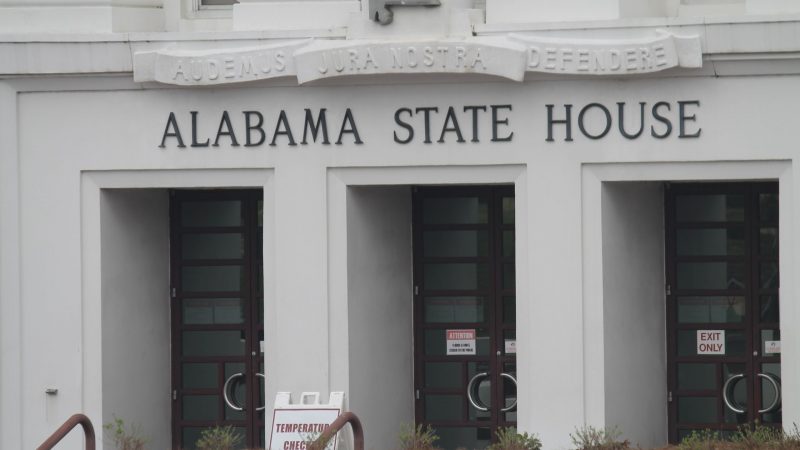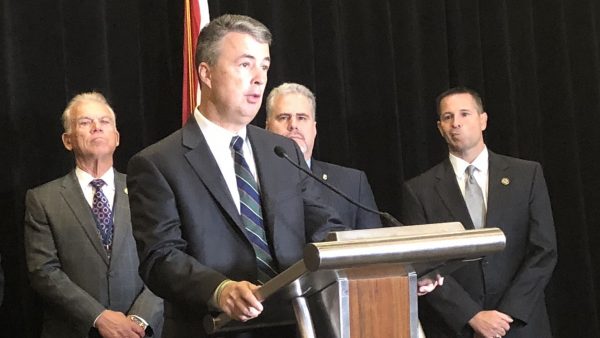God, Darwin and Dixie Part 2: Stickers
 | Birmingham — Geologist Scott Brande’s office at UAB looks like the space of any other academic — it’s cramped, overflowing with papers, books and photos; rocks and what appear to be action-figures hang out on a corner of the desk. But don’t be fooled by the clutter, this is the space of a very organized evolution defender.
| Birmingham — Geologist Scott Brande’s office at UAB looks like the space of any other academic — it’s cramped, overflowing with papers, books and photos; rocks and what appear to be action-figures hang out on a corner of the desk. But don’t be fooled by the clutter, this is the space of a very organized evolution defender.
Brande has been battling the Alabama Board of Education over various science education issues for years. He helped keep “Of Panda’s and People” — a book scientists consider blatant intelligent design propaganda — out of the state’s science classrooms. But his battle over the evolution disclaimer hasn’t been as fruitful. All though the language has been watered-down over the years, no longer coming right out and saying the theory of evolution is controversial, Brande says the intent’s still the same.
“Even though the board would like you to believe that this is not a partisan issue, this is not a sectarian issue, the fact is they inserted language into the current disclaimer that proves the issue is really one of religion and not science education.”
And Brande says this section, from the Alabama Course of Study: Science, makes that all too abundantly clear.
Many scientific theories have been developed over time. The value of scientific work, however, is not only the development of theories but also what is learned from the development process. The Alabama Course of Study: Science was developed within the context of trying to establish scientific literacy, not to question or diminish one’s beliefs and/or faith. To that end, this document includes many theories and studies of scientists’ works for examination by students. The works of Copernicus, Newton, and Einstein, to name a few, have provided a basis for much of our knowledge of the world today.
Brande maintains this clearly shows the intent to bring religion into Alabama’s classrooms, but Norris Anderson says that’s not how it is at all.
“No, no it wasn’t designed at all to bring in any other viewpoint but to make sure students understood the nature of science as applied to this particular area.”
Anderson is a former science teacher who helped author the first two disclaimers, or inserts as he prefers to call them. He says the insert came about because he and many others, including the conservative Eagle Forum of Alabama, didn’t like the way information about evolution was presented in biology texts.
“If you’re gonna teach students good science what do you want to teach them? You want to teach them how to evaluate a theory. They need to know there are certain assumptions; they need to know that all of the answers aren’t in yet. But the way it’s presented in the textbooks this is a closed area. One textbook says scientists know, for example, that evolution proceeds without plan or purpose; it’s presented in a very dogmatic manner and it closes the door for inquiry then.”
Eugenie Scott, director of the National Center for Science Education thinks that’s hogwash. Scott and her organization have been working for years to strengthen the teaching of evolution in America’s classrooms. She says, over the course of the last century, there have been three phases of the anti-evolution movement; first there was creationism, then came creation science and, most recently, intelligent design. Scott says the newest phase is nothing more than a purposeful misleading of American students.
“What we anticipate, and are beginning to see, is the fourth phase of this which is ‘teach evolution but then teach the strengths and weaknesses of evolution’. Or teach critical analysis of evolution, by which they mean criticize evolution. This to a biologist is sort of like saying well, teach that the planets go round the sun but teach the weakness of heliocentric theory and astronomers will just go ‘what weaknesses? What are you talking about?’.”
Scott says Alabama, with its latest evolution disclaimer, has entered the fourth phase.
“The current disclaimer does use this ‘critical analysis’ of evolution language which, unfortunately does encourage teachers to mis-educate students because the fact of the matter is we argue about how evolution takes place, not whether.”
Scott has an unlikely ally in her criticism of Alabama’s disclaimer; the conservative Fordham Foundation, which specializes in K-12 education issues. In 2005 it gave Alabama a big fat “F” for its science standards. While that grade came, in part, from problems the foundation found with the way the state handles physics and life science … the evolution disclaimer, alone, may have been enough to seal the deal. In its report the Fordham Foundation said this about the insert:
The Alabama preface sows confusion and offers a distorted view of what science is and how it is pursued … The statement is obviously of political, rather than scientific inspiration, and it reinforces the grade of “F”.
Alabama State Schools Superintendent Joe Morton thinks that “F” is too harsh.
“Every time they do that the reference the quote ‘the sticker insert in Alabama’. Well, that only goes into the biology textbooks yet, one subject clouds the evaluation of science standards K-12 in our state. I don’t lose any sleep over it but I think it’s unfair.”
Cindy Willingham, former president of the Alabama Science Teacher’s Association, is bothered by the grade as well.
“It should be addressed, to the exclusion of everything else maybe that is a little bit unfair, but the fact of the matter is it is a very hot topic right now and that’s, of course, what they’e going to be zeroing in on.
While Willingham’s concerned about the state’s failing grade, there’s something else on her mind. How that “F”, and the furor surrounding it and the evolution disclaimer, is affecting Alabama’s science teachers and, ultimately, Alabama’s students.
“I think you’re always going to find those teachers who are afraid to deal with controversy and I can understand that. But of course it is in the course of study and it is in the textbook and so I don’t see that it would be feasible to totally ignore that and it is one of the unifying principles of biology, science, all through, any kind of science discipline, I think that’s unfair to the students.”
Science teachers from all over the state fill McWane Center in downtown Birmingham during a recent conference of the Science Teacher’s Association. They learn about chemistry and life sciences, as well as a bit about Alabama archeology…
“Saying mososaur is like saying cat, there are several different species of mososaur. We find, about two dozen different species in Alabama, you don’t find that many anywhere else in the world.”
During one session UAB’s Scott Brande, as he does every year, speaks with teachers about evolution.
“The disclaimer history actually goes back to the early 1920’s in California but the more modern disclaimers really originated in Texas in the early 70’s.”
Brande spends his hour going over the history of the anti-evolution movement as well as discussing what exactly evolution does, and does not, tell scientists about the natural world. At the end he fields questions from the teachers…
“Teacher: I was asked a very profound question by a parent; if we stop teaching evolution all together how would that possibly negatively affect the study of science? Brande: We stop teaching evolution we will have a population that fails to understand modern medicine because evolution, as Theodosius Dzhenzky said back in 1957, ‘Nothing in biology makes sense without evolution’.”
Brande says it’s vital teachers understand the theory of evolution and why Alabama’s disclaimer is so damaging. He says if they don’t then they’re setting their students up for failure in not only future biology classes, but science classes of any kind.
“It’s an issue that, I think, pervades all of those science classes and ultimately affects their view about the role that science plays in the modern world. That, I think, really is the most important part of the issue for me. The fact that these kids aren’t going to have the kind of understanding they really need to have in order to negotiate their way through a more complex world in the 21st century.”
There are rumblings that Alabama’s evolution disclaimer may actually retrograde — moving back to the plainer, more obvious language discounting evolution. If that happens things could get ugly; the Cobb County, Georgia, school district is in a whole heap of legal trouble over its disclaimer … a disclaimer that was pulled, pretty much word for word, from Alabama’s 1995 original.
How food stamps could play a key role in fixing Jackson’s broken water system
JXN Water's affordability plan aims to raise much-needed revenue while offering discounts to customers in need, but it is currently tied up in court.
Alabama mine cited for federal safety violations since home explosion led to grandfather’s death, grandson’s injuries
Following a home explosion that killed one and critically injured another, residents want to know more about the mine under their community. So far, their questions have largely gone unanswered.
Crawfish prices are finally dropping, but farmers and fishers are still struggling
Last year’s devastating drought in Louisiana killed off large crops of crawfish, leading to a tough season for farmers, fishers and seafood lovers.
Lawmakers consider medical cannabis revamp
It’s been three years since Alabama lawmakers passed legislation establishing a system to govern medical cannabis in the state, yet not one prescription for the drug has been filled. The rollout has been delayed by lawsuits and conflict over the licensing process.
Man arrested in connection with device that exploded outside Alabama attorney general’s office
Kyle Benjamin Douglas Calvert, 26, of Irondale, Alabama, was arrested Wednesday on charges of malicious use of an explosive and possession of an unregistered destructive device, the U.S. attorney’s office said.
For some Gulf South schools, a March Madness loss can still be a win off the court
Making it into the NCAA Tournament can translate to boosts in student enrollment, athletic involvement, merchandise sales and more for participating schools.







